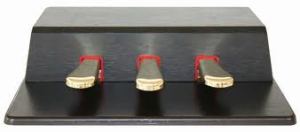Some Exercises Using the Pedal for Jazz Ballad Playing (and other pieces)
December 9, 2010 at 2:52 am | Posted in Uncategorized | Leave a commentTags: Pedagogy, pedal, Piano
 To Become More Conscious of the Way You Pedal
To Become More Conscious of the Way You Pedal
- change the pedal with the left foot instead of the right
- change the pedal using the side of your foot (with your foot rotating rather than moving up and down)
- change the pedal every eighth note (and only every eighth note)
- change the pedal every quarter note (and only every quarter note)
- change the pedal every dotted quarter note (and only every dotted quarter)
- change the pedal every half note (and only every half note)
- change the pedal every off-beat (and only every off-beat)
Exercises to Make You More Aware of Your Counterpoint
- change the pedal with each note played in the soprano voice (and only those notes)
- change the pedal with every note played in the alto voice (and only those notes)
- change the pedal with every note played in the tenor voice (and only those notes)
- change the pedal with every note played in the bass voice (and only those notes)
- change the pedal with every note played in the right hand (and only those notes)
- change the pedal with every note played in the left hand (and only those notes)
Jazz, Jazzy, Jazziest
December 9, 2010 at 2:45 am | Posted in Uncategorized | Leave a commentTags: Essay, Jazz, Music, Philosophy
 I cannot stand the word “jazzy.” Quite honestly, “jazzy,” along with perennial barf-inducing phrases “jazz hands” and “jazzercise,” makes me cringe at the thought of identifying myself as a “jazz musician.”
I cannot stand the word “jazzy.” Quite honestly, “jazzy,” along with perennial barf-inducing phrases “jazz hands” and “jazzercise,” makes me cringe at the thought of identifying myself as a “jazz musician.”
Allow me to try to explain: For me, the noun “jazz” has always had two overlapping definitions. One is a philosophical definition – jazz is a music rooted in improvisation. Nearly any style of music can involve extemporization, but jazz grows out of the soil of complex spontaneous creation and interaction.[1] Jazz is music of the inchoate, of perennial becoming, of constant growth and reshaping; this is why it’s an unbelievable experience to hear jazz musicians create something together. Conversely, jazz is also a musical style, one that’s very difficult to define because it aggregates a variety of genres from Dixieland to jazz-rock. I’ve created a definition that I think encapsulates the vast majority of these styles – “any music stylistically similar to the music of Louis Armstrong or Miles Davis, or any of their prominent collaborators.” Although this definition functions like “six degrees of Kevin Bacon,” it actually does a decent job of labeling a lot of appropriate works as “jazz” (and keeping out the non-jazz flotsam). [2]
These two definitions – in my opinion – need not both be met for an album or a group to be considered “jazz.” They overlap like a Venn diagram whose shared area boasts a core that’s inarguably jazz, but has plenty of other music – jazz or not, you can decide – lurking on its outer circles.
Which gets us back to “jazzy.” First of all, “jazzy” is grammatically unnecessary because “jazz” acts as a noun and an adjective; you can legitimately request a “jazz number” from your local “jazz band” and be a verifiable “jazz head.” So what extra meaning can “jazzy” provide? “Jazzy” indicates music that sounds like jazz but isn’t – music that meets the second definition, but probably not the first. The first definition, based on the performers’ methods is rendered unimportant whereas the second definition, which prioritizes the listeners’ experience, is given weight. The word eliminates the notion of musicians investing themselves in the process of creating music and requires only that they play something that the audience knows and recognizes as jazz. By initiating a musical experience dependent upon the listener, the scope of the performer’s repertoire is significantly limited by society’s perception of what constitutes “jazz,” extremely limiting the scope of the second definition.[3] “Jazzy” music suggests imitation of a known sound, the exact opposite of what the “spirit of jazz,” on-the-spot musical reinvention, should entail.
Admittedly, the word is perhaps more offensive to me than most, because I consciously ascribe to only the first of the two definitions. Jazz interests me because it provides a means of direct self-expression, but the style or tradition doesn’t concern me.[4] By disregarding the dynamic way that the music is made, the word “jazzy” nullifies the spirit of the music that I (and many others) find electric and ineffable, while recommending music that is often consciously antiquated and imitative.
So, remember, requesting a “jazz tune” earns you an appreciative nod from a band whereas requesting a “jazzy tune” earns you a roll of the eyeballs – or worse, if there’s no tip. And all that jazz.
[1] Certainly not all of what we call “jazz” has been based around improvisation – big band music, most prominently, comes to mind as a staple of the “jazz” idiom in which improvisation serves as something of a sidebar.
To be more theoretically specific, “jazz” can also be defined as “music that includes harmonically complex improvisation.” By “harmonically complex,” I mean that – if in a tonal context – the improviser includes upper extensions or altered tones other than those found in the traditional blues scale. More on this, if you’re interested.
[2] This second definition presents an interesting theory of why the genre is at something of a crisis; because so many Miles Davis collaborators have either passed away or are approaching old age, the genre – as defined here – needs different ways to define itself. As the link to the purported defining epicenter of jazz becomes more tenuous, the jazz community may have to (subconsciously) recalculate the core criteria for the genre.
[3] Cynically (and therefore completely unscientifically), my definition would be “anything sung by Ella Fitzgerald, Frank Sinatra, or Nat “King” Cole.”
[4] And, to be honest, I feel somewhat alienated by a wide-range of social aspects that are part of the “jazz tradition.”
Lyrics – Little Love Song
December 9, 2010 at 2:41 am | Posted in Uncategorized | Leave a commentTags: Love Song, Lyrics
 Skin of Pearl, Sapphire Eyes
Skin of Pearl, Sapphire Eyes
Through the door and up the banister he glides
Singing crystal tunes that grew in olden times
Singing soft, singing low:
A little love song, just music and melody,
Sounds sweeter than any truth you could tell to me.
Night of blue, violet morn
His voice ringing in the starlight through the door
He was singing quiet love songs and I’d wonder who they’re for
Listen close, could it be? They’re for me, they’re for me.
The Bizzie Boys – a Children’s Story
December 9, 2010 at 2:35 am | Posted in Uncategorized | Leave a commentTags: Children, Poetry, Story
They drive through the country and run through the city,
Spinning round and around ‘til their bodies feel dizzy,
To ballets and barns, bistros, ballrooms, and bridges,
Those three Bizzie Boys are so brilliantly busy!
Every day they do ten things that make a kid giddy,
Eating meals that are sizzling, drinking drinks that are fizzy,
Taking trains, training tuna, and tuning trombones,
Those three Bizzie Boys are terrifically busy!
But not everyone likes seeing boys in a tizzy:
Their neighbor, a girl whose long red hair is frizzy
And big as a beehive, is named Dorothy Grohley,
And she thinks the Bizzie Boys should move more slowly.
“I think having too much to do is a pity,”
Says Dorothy to Brian and Ryan and Izzy.
“You’re wasting your chances to watch the world’s wonders!”
But the boys just ignore her – they think Dorothy’s too prissy.
Then one night, coming back from their student committee,
They hear Dorothy outside – she’s not crying there, is she?
Yes, she’s sobbing and sniveling, she’s blubbering and bawling,
“Those three Bizzie Boys are too terribly busy!”
So out come the boys, they lie down right beside her
And stop – as they rest there, the loud world grows quieter.
The boys sit in silence, like they’ve heard something holy,
As the sobs start to soften from Dorothy Grohley.
“I’m sorry to cry, but with you boys so busy,
I suspect, if I left, you’d have no time to miss me.”
And Dorothy continues, her voice hushed and hissy,
“But when you take time, you find magic exists…see?”
Then she spreads out her hands and she points to the skies
Where the galaxies and planets astonish their eyes.
Up above in the dark, they see Venus and Mars
While the sky’s silent symphony glitters with stars.
Since that night, Ryan, Brian, and Izzy, and Dorothy
Spend some of their time very busily exploring,
But they also make time to stare up at the skies,
To take walks by the river, to catch fireflies.
To relax – that’s the wisdom of Dorothy Grohley,
You discover life’s wonders when moving more slowly –
For life’s not a footrace from city to city
And even Bizzie Boys need breaks from being busy.
When Linda Died: Poem in the Model of the Confessionals
December 8, 2010 at 5:16 pm | Posted in Uncategorized | Leave a commentTags: Poetry
 I wish I cried when Linda died,
I wish I cried when Linda died,
I wish I couldn’t eat.
I wish I sobbed my eyes blood-red
And woke each night from sleep
Soaked through with sweat from ghastly dreams
And feeling faint and dizzy-weak.
Or screamed or vomited or gagged
Until it burned to speak.
When Linda died, I sadly sighed
And stared down at my plate.
Ate dinner – quiet, but polite –
And feeling quite sedate,
Went straight to bed at half-past-ten
And slept alarming well,
Though I craved violent, vicious dreams
In which my grief rose to rebel
And make me feel – Something – Deeply.
When Linda sealed her suicide
I didn’t bawl or weep.
Though I despise the way she died,
In a bathtub – knife to vein –
I envy her:
I wish my wounds were carved so deep
That I could feel the pain.
Create a free website or blog at WordPress.com.
Entries and comments feeds.
